Contributing to ofxtools¶
To start hacking on the source, see the section entitled “Developer’s installation” under Installing ofxtools.
Make sure your changes haven’t broken anything by running the tests:
python `which nosetests` -dsv --with-coverage --cover-package ofxtools
Or even better, use make:
make test
After running one of the above commands, you can view a report of which parts of the code aren’t covered by tests:
coverage report -m
Poke around in the Makefile; there’s a few developer-friendly commands there.
Feel free to create pull requests on ofxtools repository on GitHub.
If you commit working tests for your code, you’ll be my favorite person.
Adding New OFX Messages¶
As an example, I’ll document the implementation of bank fund transfers.
Download a copy of the OFXv2.03 spec. The messages we want to implement
are located in Section 11.7. Since these messages appear in the hierarchy
under BANKMSGSETV1, we’ll put them under ofxtools.models.bank.
Request and Response¶
In order to implement INTRARQ (the command clients use to request
a funds transfer) we’ll first need to define any aggregates it refers to -
in this case, XFERINFO.
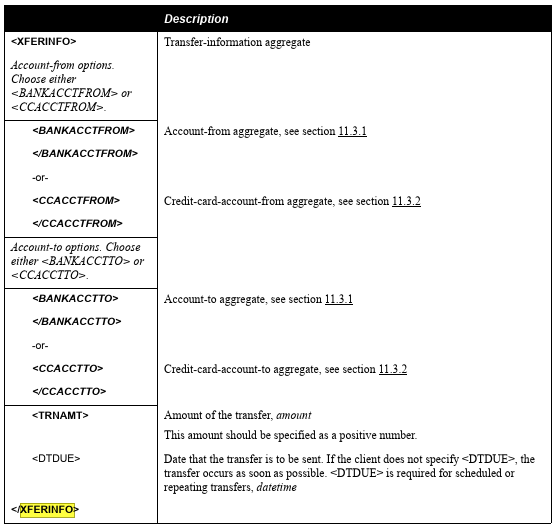
Here’s how we translate the spec info Python.
from ofxtools.models.base import Aggregate, SubAggregate
from ofxtools.Types import String, Decimal, DateTime, OneOf
from ofxtools.models.bank.stmt import (
BANKACCTFROM, BANKACCTFROM, CCACCTFROM, CCACCTTO,
)
class XFERINFO(Aggregate):
""" OFX section 11.3.5 """
bankacctfrom = SubAggregate(BANKACCTFROM)
ccacctfrom = SubAggregate(CCACCTFROM)
bankacctto = SubAggregate(BANKACCTTO)
ccacctto = SubAggregate(CCACCTTO)
trnamt = Decimal(required=True)
dtdue = DateTime()
requiredMutexes = [
["bankacctfrom", "ccacctfrom"],
["bankacctto", "ccacctto"],
]
We create a subclass of ofxtools.models.base.Aggregate, where the class
name is the OFX tag in ALL CAPS. We define a class attribute for each tag
that can appear under XFERINFO - the attribute names must be all lowercase.
Container aggregates are defined with ofx.models.base.SubAggregate;
pass in the relevant model class.
Data-bearing elements are defined as a subclass of ofxtools.Types.Element -
Decimal for TRNAMT and DateTime for DTDUE, as indicated by
the spec. The spec prints TRNAMT in bold, which means it is required.
This constraint is enforced simply by passing required=True to the
attribute definition.
The spec also states that either BANKACCTFROM or CCACCTFROM must
appear in XFERINFO, as well as either BANKACCTTO or CCACCTTO.
We can’t simply pass in required=True to the relevant class attributes -
that would require all of them to appear in any valid XFERINFO instance,
which is clearly not right. Instead of attribute-level validation, these
kinds of class-level constraints are enforced by separate class attributes.
In this case, we employ the awkwardly-named
ofxtools.models.base.Aggregate.requiredMutexes, which requires that
exactly one of each sequence of attribute names must be passed to
Aggregate.__init__(). Note the lower-case naming.
With XFERINFO in hand, defining the request aggregate (INTRARQ) is simple.

class INTRARQ(Aggregate):
""" OFX section 11.7.1.1 """
xferinfo = SubAggregate(INTRARQ, required=True)
Now we we move on to the corresponding server response aggregate (INTRARS).
INTRARS contains a new subaggregate (XFERPRCSTS) for the server
to indicate transfer status; we’ll need to implement that first so that
INTRARS can refer to it. Here’s the spec.
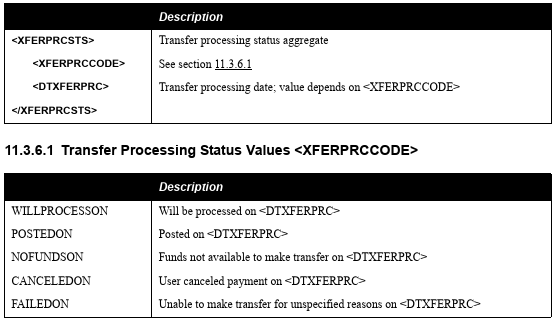
The XFERPRCCODE element only allows specifically enumerated values. Our
validator type for that is ofxtools.Types.OneOf.
class XFERPRCSTS(Aggregate):
""" OFX section 11.3.6 """
xferprccode = OneOf("WILLPROCESSON", "POSTEDON", "NOFUNDSON",
"CANCELEDON", "FAILEDON", required=True)
dtxferprc = DateTime(required=True)
Having XFERPRCSTS, we can define the response aggregate.
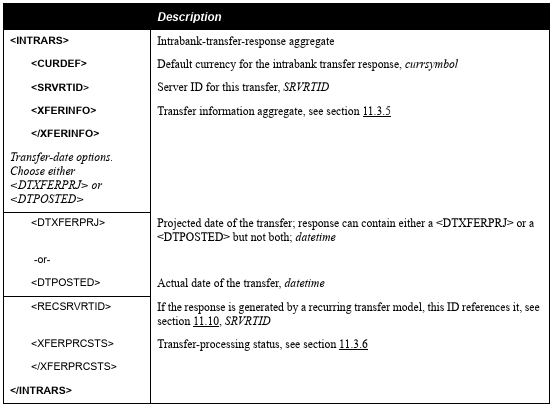
This features a new kind of constraint. While DTXFERPRJ and DTPOSTED
are mutually exclusive, the absence of boldface type indicates that it’s valid
to omit them both, which means we can’t use Aggregate.requiredMutexes as
we did for XFERINFO above.
Instead we express this class-level constraint via Aggregate.optionalMutexes,
again using lower-cae attribute names within.
from ofxtools.models.i18n import CURRENCY_CODES
class INTRARS(Aggregate):
""" OFX section 11.7.1.2 """
curdef = OneOf(*CURRENCY_CODES, required=True)
srvrtid = String(10, required=True)
xferinfo = SubAggregate(XFERINFO, required=True)
dtxferprj = DateTime()
dtposted = DateTime()
recsrvrtid = String(10)
xferprcsts = SubAggregate(XFERPRCSTS)
optionalMutexes = [
["dtxferprj", "dtposted"],
]
The definition of currsymbol type refers to the three-letter currency codes
in ISO-4217. Happily we’ve already defined them in ofxtools.models.i18n.
Also note the ofxtools.Types.String validator; it takes an (optional)
length argument of type int.
n addition to creating account transfers with INTRARQ, there are also
messages for clients to modify or cancel existing transfer requests. We’ll
just bang these out.

class INTRAMODRQ(Aggregate):
""" OFX section 11.7.2.1 """
srvrtid = String(10, required=True)
xferinfo = SubAggregate(XFERINFO, required=True)
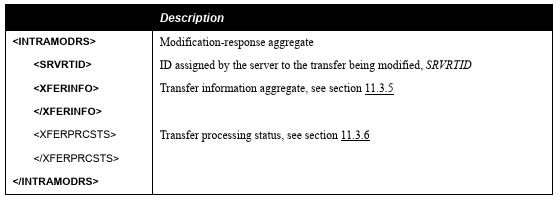
class INTRAMODRS(Aggregate):
""" OFX section 11.7.2.2 """
srvrtid = String(10, required=True)
xferinfo = SubAggregate(XFERINFO, required=True)
xferprcsts = SubAggregate(XFERPRCSTS)

class INTRACANRQ(Aggregate):
""" OFX section 11.7.3.1 """
srvrtid = String(10, required=True)

class INTRACANRS(Aggregate):
""" OFX section 11.7.3.2 """
srvrtid = String(10, required=True)
Those are all the basic funds transfer commads, but we’re not quite done yet. Every request or response in OFX is transmitted in a transaction wrapper bearing a unique identifier, The structure of these wrappers is laid out in Section 2.4.6.1 of the OFX spec.
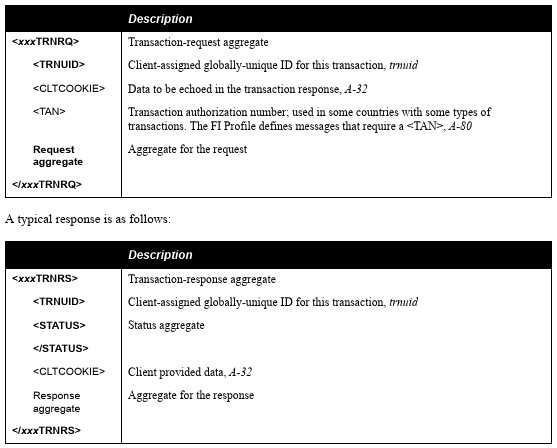
This commonly-repeated pattern is factored out in
ofxtools.models.wrapperbases as base classes for the various
*TRNRQ / *TRNRS classes to inherit.
class TrnRq(Aggregate):
trnuid = String(36, required=True)
cltcookie = String(32)
tan = String(80)
class TrnRs(Aggregate):
trnuid = String(36, required=True)
status = SubAggregate(STATUS, required=True)
cltcookie = String(32)
Using these base classes, we just need to add attributes for each type of request/response they can wrap, along with class-level constraints enforcing the choice of a single wrapped entity.
Note that *TRNRQ wrappers must contain a request, while the spec
allows empty *TRNRS wrappers, so we set requiredMutexes and
optionalMutexes respectively.
from ofxtools.models.wrapperbases import TrnRq, TrnRs
class INTRATRNRQ(TrnRq):
""" OFX section 11.7.1.1 """
intrarq = SubAggregate(STMTRQ)
intramodrq = SubAggregate(INTRAMODRQ)
intracanrq = SubAggregate(INTRACANRQ)
requiredMutexes = [
["intrarq", "intramodrq", "intracanrq"],
]
class INTRATRNRS(TrnRs):
""" OFX section 11.7.1.2 """
intrars = SubAggregate(INTRARS)
intramodrs = SubAggregate(INTRAMODRS)
intracanrs = SubAggregate(INTRACANRS)
optionalMutexes = [
["intrars",
"intramodrs",
"intracanrs",
"intermodrs",
"intercanrs",
"intermodrs"],
]
Recurring Requests¶
In addition to one-time fund transfer requests, a bit further down the spec
also details messages for creating, modifying, and canceling recurring funds
transfers. This just repeats the pattern of INTRARQ and INTRARS.

class RECINTRARQ(Aggregate):
""" OFX section 11.10.1.1 """
recurrinst = SubAggregate(RECURRINST, required=True)
intrarq = SubAggregate(INTRARQ, required=True)
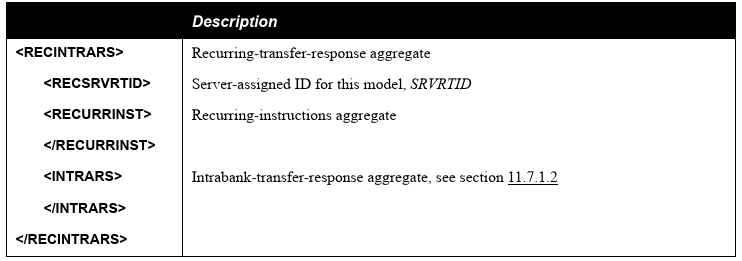
class RECINTRARS(Aggregate):
""" OFX section 11.10.1.2 """
recsrvrtid = String(10, required=True)
recurrinst = SubAggregate(RECURRINST, required=True)
intrars = SubAggregate(INTRARS, required=True)
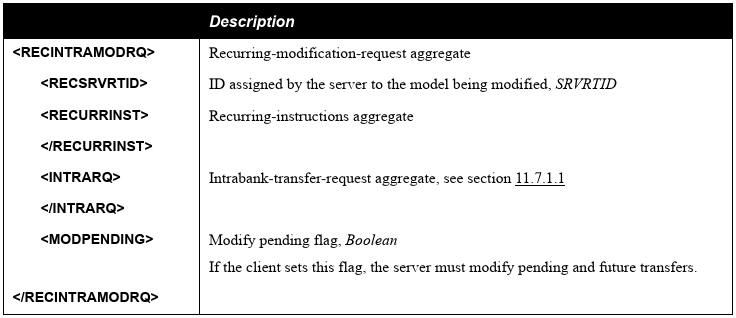
class RECINTRAMODRQ(Aggregate):
""" OFX section 11.10.2.1 """
recsrvrtid = String(10, required=True)
recurrinst = SubAggregate(RECURRINST, required=True)
intrarq = SubAggregate(INTRARQ, required=True)
modpending = Bool(required=True)
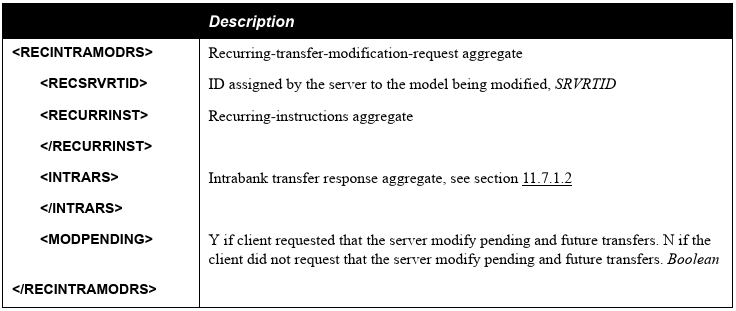
class RECINTRAMODRS(Aggregate):
""" OFX section 11.10.2.2 """
recsrvrtid = String(10, required=True)
recurrinst = SubAggregate(RECURRINST, required=True)
intrars = SubAggregate(INTRARS, required=True)
modpending = Bool(required=True)

class RECINTRACANRQ(Aggregate):
""" OFX section 11.10.3.1 """
recsrvrtid = String(10, required=True)
canpending = Bool(required=True)

class RECINTRACANRS(Aggregate):
""" OFX section 11.10.3.2 """
recsrvrtid = String(10, required=True)
canpending = Bool(required=True)

class RECINTRATRNRQ(TrnRq):
""" OFX section 11.10.1.1 """
recintrarq = SubAggregate(RECINTRARQ)
recintramodrq = SubAggregate(RECINTRAMODRQ)
recintracanrq = SubAggregate(RECINTRACANRQ)
requiredMutexes = [
["recintrarq", "recintramodrq", "recintracanrq"],
]

class RECINTRATRNRS(TrnRs):
""" OFX section 11.10.1.2 """
recintrars = SubAggregate(RECINTRARS)
recintramodrs = SubAggregate(RECINTRAMODRS)
recintracanrs = SubAggregate(RECINTRACANRS)
optionalMutexes = [
["recintrars", "recintramodrs", "recintracanrs"],
]
Synchronization¶
Besides commands to perform funds transfers, the OFX spec also defines messages for downloading funds transfer activity. The synchronization protocol and its messages are detailed in a different chapter of the spec - Section 11.12.2.
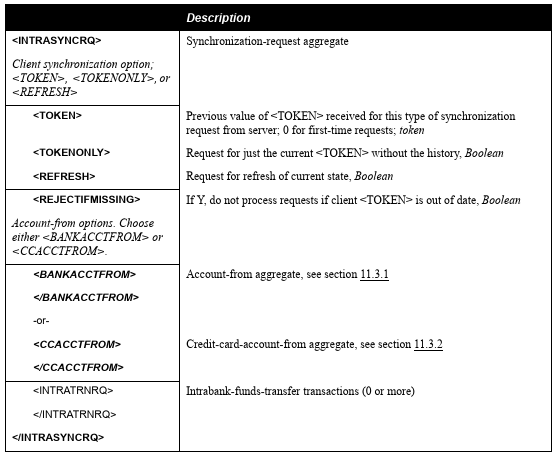
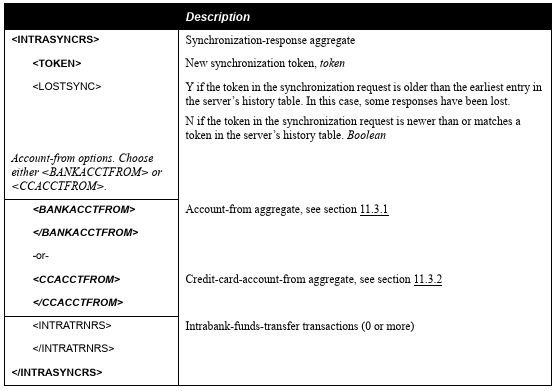
The requirement that each *SYNCRQ / *SYNCRS may contain a variable
number of transaction wrappers means that we can’t define these wrappers with
SubAggregate, which maps every child element to a single class attribute.
Contained aggregates that are allowed to appear more than once are instead
defined with a validator of type ListAggregate, and accessed via the Python list
API. Unique children are defined in the usual manner, and accessed as instance
attributes.
Here’s how it looks in ofxtools.models.bank.sync.
from ofxtools.Type import ListAggregate
from ofxtools.models.bank.stmt import BANKACCTFROM, CCACCTFROM
from ofxtools.Types import Bool
class INTRASYNCRQ(Aggregate):
""" OFX section 11.12.2.1 """
token = String(10)
tokenonly = Bool()
refresh = Bool()
rejectifmissing = Bool(required=True)
bankacctfrom = SubAggregate(BANKACCTFROM)
ccacctfrom = SubAggregate(CCACCTFROM)
intratrnrq = ListAggregate(INTRATRNRQ)
requiredMutexes = [
["token", "tokenonly", "refresh"],
["bankacctfrom", "ccacctfrom"]
]
class INTRASYNCRS(Aggregate):
""" OFX section 11.12.2.2 """
token = String(10, required=True)
lostsync = Bool()
bankacctfrom = SubAggregate(BANKACCTFROM)
ccacctfrom = SubAggregate(CCACCTFROM)
intratrnrs = ListAggregate(INTRATRNRS)
requiredMutexes = [
["bankacctfrom", "ccacctfrom"],
]
class RECINTRASYNCRQ(Aggregate):
""" OFX section 11.12.5.1 """
token = String(10)
tokenonly = Bool()
refresh = Bool()
rejectifmissing = Bool(required=True)
bankacctfrom = SubAggregate(BANKACCTFROM)
ccacctfrom = SubAggregate(CCACCTFROM)
recintratrnrq = ListAggregate(RECINTRATRNRQ)
requiredMutexes = [
["token", "tokenonly", "refresh"],
["bankacctfrom", "ccacctfrom"],
]
class RECINTRASYNCRS(Aggregate):
""" OFX section 11.12.5.2 """
token = String(10, required=True)
lostsync = Bool()
bankacctfrom = SubAggregate(BANKACCTFROM)
ccacctfrom = SubAggregate(CCACCTFROM)
recintratrnrs = ListAggregate(RECINTRATRNRS)
requiredMutexes = [
["bankacctfrom", "ccacctfrom"],
]
Extending the Message Set¶
We have defined the funds transfer service, but we still need to add it to
the banking message set (the top-level wrappers). We need to edit the
relevant classes in ofxtools.models.msgsets.
class BANKMSGSRQV1(List):
""" OFX section 11.13.1.1.1 """
...
intratrnrq = ListAggregate(INTRATRNRQ)
recintratrnrq = ListAggregate(RECINTRATRNRQ)
intrasyncrq = ListAggregate(INTRASYNCRQ)
recintrasyncrq = ListAggregate(RECINTRASYNCRQ)
...
class BANKMSGSRSV1(List):
""" OFX section 11.13.1.1.2 """
...
intratrnrs = ListAggregate(INTRATRNRS)
recintratrnrs = ListAggregate(RECINTRATRNRS)
intrasyncrs = ListAggregate(INTRASYNCRS)
recintrasyncrs = ListAggregate(RECINTRASYNCRS)
...
Then we need to define the funds transfer profile.

class XFERPROF(ElementList):
""" OFX section 11.13.2.2 """
procdaysoff = ListElement(OneOf(*DAYS))
procendtm = Time(required=True)
cansched = Bool(required=True)
canrecur = Bool(required=True)
canmodxfer = Bool(required=True)
canmodmdls = Bool(required=True)
modelwnd = Integer(3, required=True)
dayswith = Integer(3, required=True)
dfltdaystopay = Integer(3, required=True)
Finally, we add the funds transfer profile to the message set.
class BANKMSGSETV1(Aggregate):
""" OFX section 11.13.2.1 """
...
xferprof = SubAggregate(XFERPROF)
...
All done!